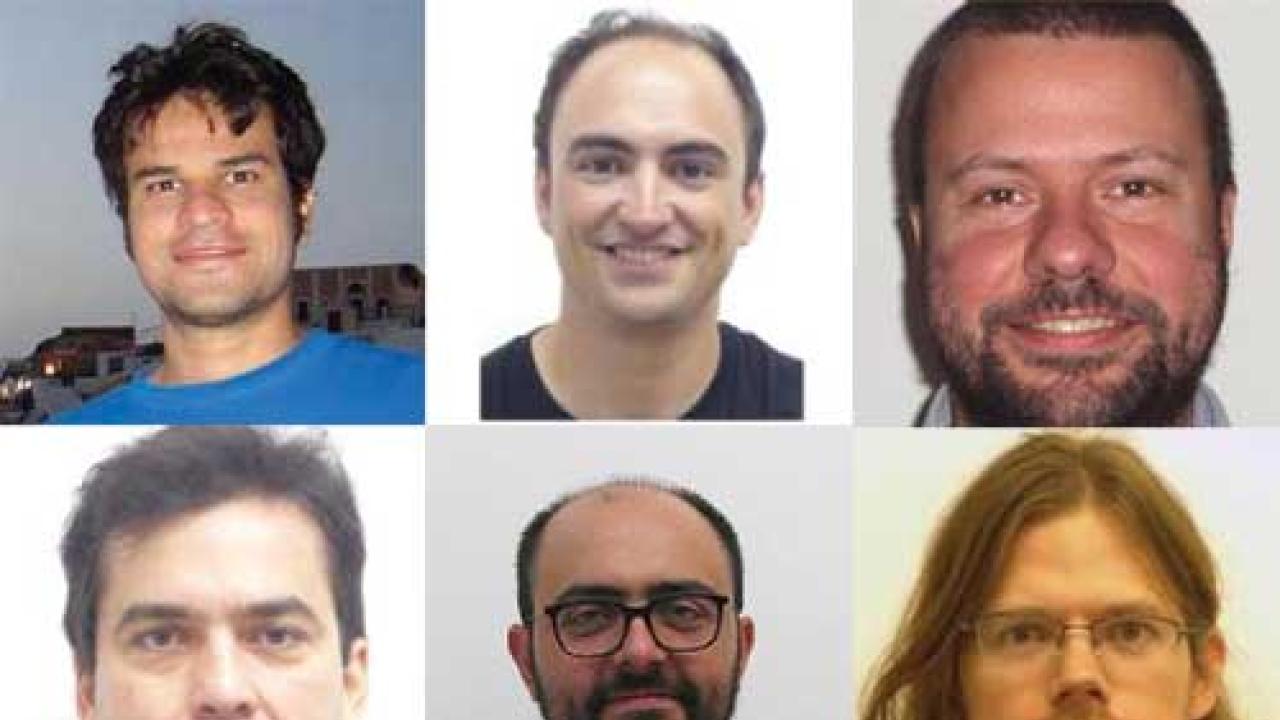
Over the past year, ICTP has welcomed no less than six new researchers to its scientific staff, who now contribute to ICTP’s research environment. Research is only one of two key facets of being a scientific staff member at ICTP: unlike many other permanent positions in research, helping with scientific capacity building in developing countries is a key part of working at ICTP. It is one of the many reasons that scientists chose ICTP. Meet the new researchers: two mathematicians, one quantitative life scientist, one high energy physicist, and two condensed matter physicists who are now helping expand ICTP's research scope.
“The focus of ICTP on the career development of young scientists from developing countries is truly remarkable,” says Édgar Roldán, a new staff scientist in the Quantitative Life Sciences section. “This connection to the entire world, and its mission of science without frontiers is what made me believe that ICTP was the optimal choice at this stage of my career.” His research focuses on stochastic thermodynamics and biophysics, investigating the thermodynamics of non-equilibrium processes that happen in the mesoscopic world, at scales from just a few nanometers to several microns.
Sliding up the atomic size scale just a bit, condensed matter physicist Nicola Seriani, newly appointed staff researcher in ICTP's Condensed Matter and Statistical Physics section, focuses on computational materials science. "The functional behaviour of materials for energy conversion and storage (for photovoltaics, for photocatalysis, for batteries) is often difficult to predict. The goal of my research is to develop an understanding of these phenomena, and possibly in the future to develop predictive tools for them." Seriani is originally from Trieste, and travels frequently for conferences and workshops that he often helps organize. " I find it very rewarding to have an impact on scientific capacity building. I really also appreciate a lot, and I am very proud of the fact that ICTP is located in my home town!"
Seriani is not the only new researcher in the Condensed Matter Physics section: Marcello Dalmonte, who first joined ICTP as the Ludwig Boltzmann Fellow, is now a staff scientist. His research focuses on collective behavior, many-body quantum phenomena, and entanglement. "I chose ICTP so I could carry out top level research and, at the same time, contribute to the developments of science and education in developing countries," says Dalmonte. "I truly believe that concepts such as intercultural exchange and peaceful relationships are facilitated by the scientific language - which is universal - so science shall, and must play a pivotal role in this endeavour." A research collaboration between Dalmonte and colleagues at the University of Padua has recently been chosen to join a consortium of researchers studying quantum simulation under the €1 billion European Commission's Quantum Flagship programme.
Some of those connections can result in new permanent researchers, as is the case with Emanuel Carneiro, a new mathematician who works in harmonic analysis and studies oscillatory phenomena, those that often crop up in telecommunications, signal processing, data compression tools, and modern biomedical equipment. "I first came here as a Simons Associate in 2016 and 2017. I like very much the friendly atmosphere of the Institute and of the city of Trieste and, of course, a new experience always brings something positive," says Carneiro. He adds, "I am looking forward to exploring the great potential of ICTP to work together with scientists, students, visitors, and institutions from developing countries and help them reach their goals."
Another mathematician recently joined ICTP's Mathematics section: Pavel Putrov, who has a joint appointment with ICTP's High Energy, Cosmology and Astroparticle Physics section. "I have broad research interests in mathematical aspects of quantum field theory and string theory, and especially their relation to geometry and topology. I always find it very exciting and useful to apply modern techniques of theoretical physics to problems in mathematics and vice versa," says Putrov. "I find the diverse ICTP environment to be very inspiring and productive."
The final new staff member, Kyriakos Papadodimas, has just started at ICTP in the High Energy Section. Papadodimas works on quantum fields and string theory, figuring out what exactly is happening inside of black holes. The overarching goal is the development of quantum gravity theory, quantum effects on a much more massive scale compared to Dalmonte's work.
ICTP is looking forward to seeing these six new researchers thrive and expand the reach and mission of ICTP throughout the world. Welcome to ICTP!
















